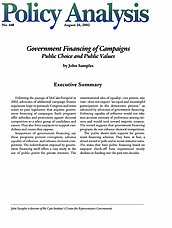Supporters of government financing say these programs prevent corruption, advance equality of influence, and enhance electoral competition. The redistribution imposed by government financing itself offers a case study in the use of public power for private interests. The constitutional idea of equality–one person, one vote–does not require “an equal and meaningful participation in the democratic process,” as advanced by advocates of government financing. Enforcing equality of influence would not take into account intensity of preferences among citizens and would tend toward majority tyranny. The record suggests that government financing programs do not enhance electoral competition.
The public shows little support for government financing schemes. They have, at best, a mixed record in polls and in recent initiative votes. The states that have public financing based on taxpayer check-off have experienced steady declines in funding over the past two decades.


